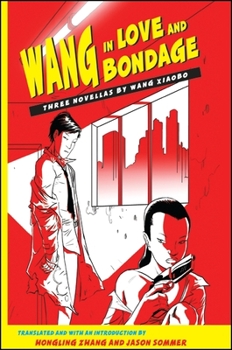Wang in Love and Bondage
Select Format
Select Condition 
Book Overview
Wang Xiaobo was born in Beijing in 1952. At the beginning of the Cultural Revolution, he was sent to rural Yunnan for "rustification," but later, in the 1970s, studied economics at Renmin University of China. He received a master's degree from the University of Pittsburgh in 1988, and, after returning to China, taught at Beijing University and at Renmin. Wang's published works include four fiction collections and two essay collections. Hongling Zhang teaches fiction writing at Fontbonne University and has published short stories in both Chinese and English. Jason Sommer is Professor of English and Poet-in-Residence at Fontbonne University. He has published three collections of poetry, including The Man Who Sleeps in My Office.
Format:Paperback
Language:English
ISBN:0791470660
ISBN13:9780791470664
Release Date:June 2008
Publisher:State University of New York Press
Length:169 Pages
Weight:0.50 lbs.
Dimensions:0.4" x 5.5" x 8.4"
Related Subjects
Contemporary Fiction Gay Humor Humor & Entertainment Humor & Satire Literary Literature & FictionCustomer Reviews
3 ratings
Excellent: Clever, Entertaining, Sexy
Published by Thriftbooks.com User , 15 years ago
I'm not sure why I purchased this book, as I had certainly never heard of Wang Xiabao before. Perhaps I was book surfing on this or another site and it caught my curiosity. At any rate, I don't enjoy reviews which over analyze or intelectualize that which is being reviewed,so I'll make this simple: For me, a great story or novel is one which I read slowly, savoring every word because I don't want it to end,something I want to read more than once, even to the point of knowing certain sections from memory because it is so good. This book meets that criteria all the way; I hope that more of his writing will be translated into english.
a great novelist discovered
Published by Thriftbooks.com User , 17 years ago
A poet tells you about himself and a novelist brings knowledge of the world. In Wang's writings we see the absurdity in China under the totalitarian rule from a compeletly different angle - yet how enlightening it is! - that power by its masochist nature has found its sadist victims. Reading through these stories marked by Wang's now famous witty and satire tone, you laugh with heavy sighs yet at same time, strangely, don't feel depressed. Other than the value of love itself Wang has tried to explore in stories like Golden Age, an important reason for this is that he has shown you a way to understand absurdity in life, by his super intelligence and the power of his calm and acute observation. As Kundera once noted: "All we can do in the face of that ineluctable defeat called life is to try to understand it. That is the raison d'être of the art of the novel." So when we read about Chen Qingyang's laments and her sudden epiphany of "so-called truth" - "The truth is that you can't wake up. That was the moment she finnaly figured out what the world was made of; and the next moment she made up her mind: she stepped forward to accept the torment. She felt unusually happy." Don't we also feel unusually sad and happy at same time? Sad at seeing "that ineluctable defeat" part of life, happy at the final understanding of the absurdity made of her living. That's the enjoyment of reading a good novel. Hats off to the great translation done by Zhang and Sommers. Wang deserves such a first-class English version for his wonderful work.
Wonderful recreation of Wang's masterpieces
Published by Thriftbooks.com User , 17 years ago
Congratulations to Hongling Zhang and Jason Sommer for the wonderful recreation of Wang's masterpieces. Highly recommended.





